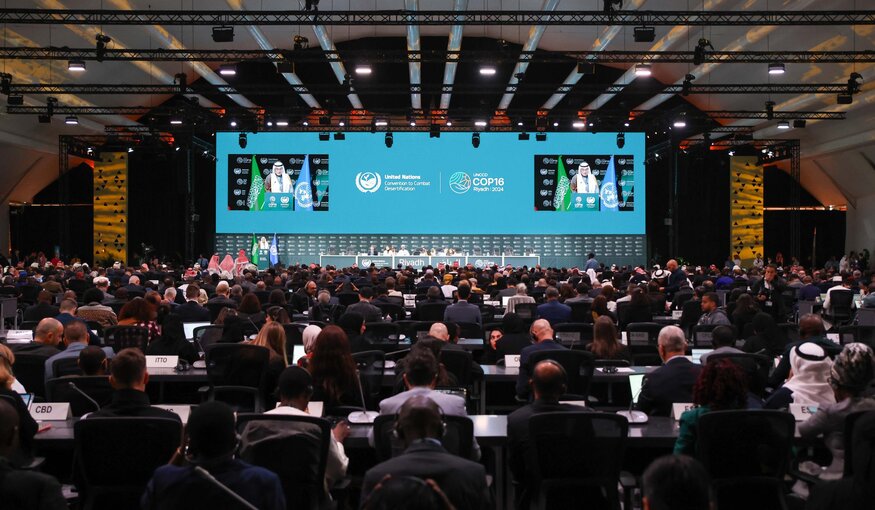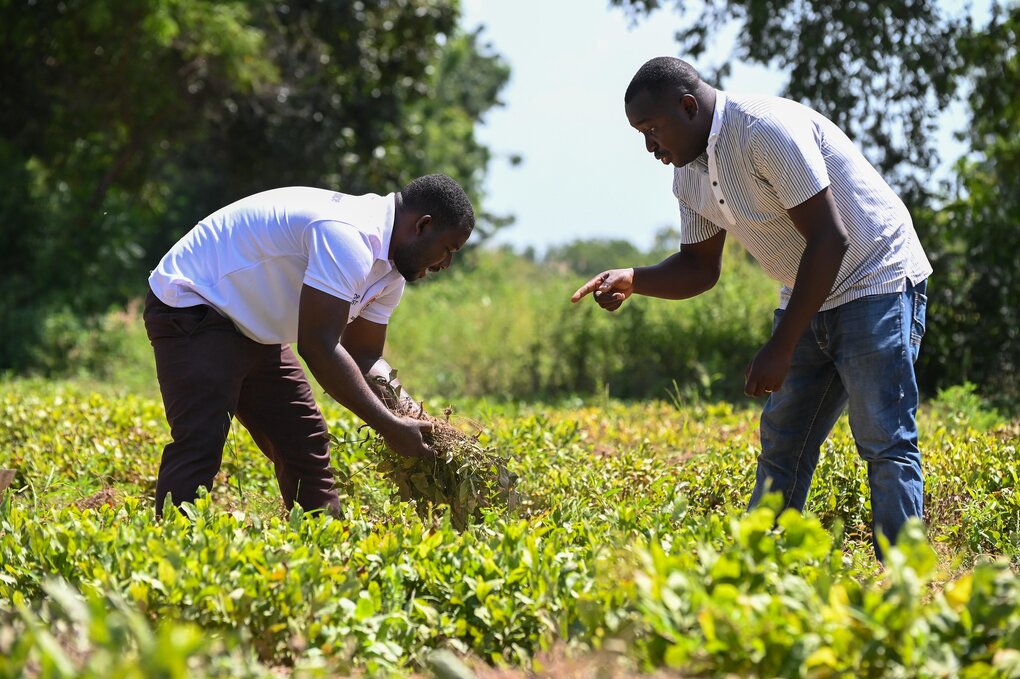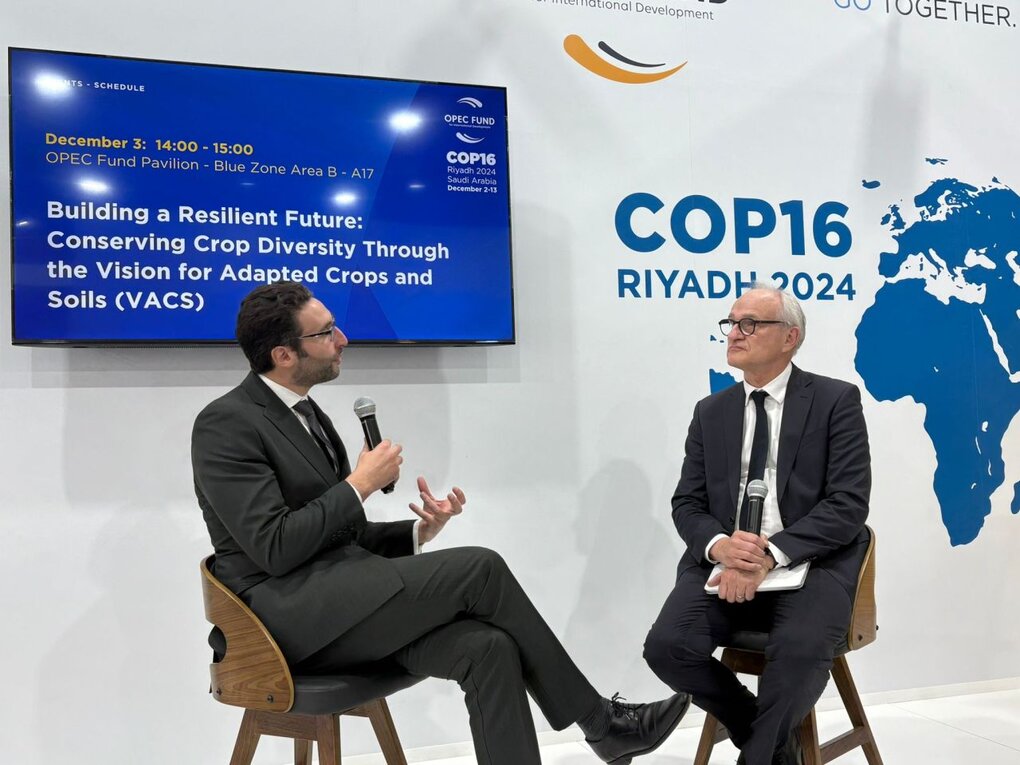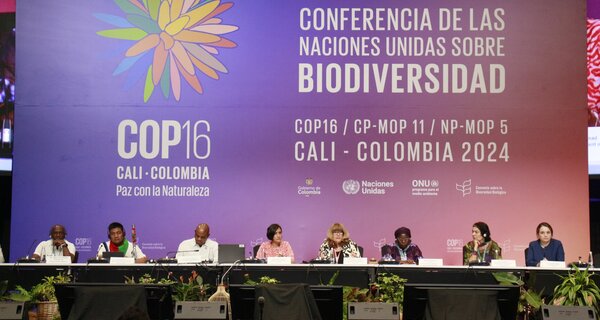UNCCD COP16: Crop Diversity as a Path to Combat Desertification and Ensure Food Security

17 December 2024
Desertification is the process of land degradation in dry areas caused by both human activities and climate change. This includes long periods of drought, rising temperatures and poor land management. Desertification leads to the depletion of fertile soil, lower crop yields and loss of biodiversity. It affects about one-third of the world’s land and puts food security at risk, especially in regions where people rely on agriculture for their livelihoods.
Fighting desertification requires solutions that restore land health and make farming more resilient. One such solution is crop diversity – growing a variety of crops that are better suited to tough conditions. Deploying crop diversity helps farmers restore the soil, conserve water and reduce the need for chemical fertilizers. Genebanks, which store seeds from many different crops and their varieties, are key to preserving this diversity. They provide the genetic material that scientists need to develop crops that can survive extreme weather and other challenges, ensuring food security in the face of desertification.
At the COP16 UN Desertification Conference in Riyadh, from 2 to 13 December 2024, the Crop Trust demonstrated the importance of crop diversity in fighting desertification. Below is a summary of key events, decisions and partnerships that took place during the conference, focusing on the importance of crop diversity in restoring land and improving human nutrition, and the Crop Trust’s role in the Vision for Adapted Crops and Soils (VACS) and opportunity crops.
The Crop Trust is deeply grateful for the ongoing support from our generous donors, including Ireland and Germany for contributions to the recently-launched Power of Diversity Funding Facility, and to Norway for its front-running investment into VACS through BOLDER, part of the Crop Trust’s BOLD project.
Additionally, Germany’s generous and forward-thinking €20M pledge to the Crop Trust Endowment Fund will ensure long-term sustainability for global genebanks, advancing our collective efforts to conserve crop diversity and strengthen food security worldwide.
“These funds will help to perpetuate the outcomes of the Power of Diversity Funding Facility and it will strengthen indigenous, nutritious food crops for a long time,” said Maria Wichmann from the German Federal Ministry for Economic Cooperation and Development (BMZ).

Dr. Patrick Attamah, Principal Technologist at CSIR-SARI, (L) and Dr. Joseph Bandanna, Research Scientist at CSIR-PGRRI, (R) examine bambara groundnut at the SARI research station in Manga, Ghana. October 2023. Photo: Neil Palmer/Crop Trust.
The Role of Crop Diversity in Combating Desertification – 3 December
As part of the formal opening statements of the conference, the Crop Trust called for action and support to solve the world’s food challenges as land degradation and climate change threaten food production.
“The world is facing three major food challenges: the need to produce more food, ensure access to food for all, and improve the quality of food,” said Joanna Purcell, Crop Trust’s Partnerships and Resource Mobilization Lead.
The statement emphasized that crop diversity is a key solution, noting that resilient crops – those that can survive drought, heat, and poor soils – are essential for reducing land degradation and building sustainable agriculture.
The Crop Trust also highlighted how genebanks act as a safety net by storing diverse plant species, which can be used to create new crop varieties that help farmers face the challenges of climate change. “Investing in crop diversity is investing in a sustainable future," said Purcell.
Watch the recording of the Crop Trust’s formal statement here.
Water Sustainability: How Crop Diversity Enhances Resilience – 3 December
Stefan Schmitz (R) at the Building a Resilient Future: Conserving Crop Diversity Through the Vision for Adapted Crops and Soils (VACS) panel.
On 3 December, the focus was on water sustainability, an important topic for tackling desertification. In the afternoon, the Crop Trust and the OPEC Fund for International Development co-hosted a panel on Building a Resilient Future: Conserving Crop Diversity Through the Vision for Adapted Crops and Soils (VACS). This event explored how the VACS framework uses crop diversity to fight land degradation and build resilient food systems.
“The VACS framework is about creating agricultural systems that are climate-resilient and sustainable,” Schmitz explained during the panel. “By focusing on drought-tolerant crops and land restoration, we can build systems that not only survive but thrive.”
The panel also highlighted the importance of collaboration and action among stakeholders to implement the VACS framework effectively.

Launch Event of the 5-year Global Flagship Initiative for Food Security.
Accelerating the Global Effort on Land Restoration and Collaboration – 4 December
Land Day on 4 December was dedicated to the role of healthy land in combating climate change, creating jobs and reducing poverty.
Stefan Schmitz participated in the Food Security Flagship Impact panel on driving innovation, empowering smallholder farmers and building resilient food systems. This session explored the transformative role of the new five-year Global Flagship Initiative for Food Security, with a focus on scaling evidence-based and cost-effective innovations to address land degradation and drought in the Sahel and beyond.
These conversations were a precursor to the launch on 5 December of a five-year Global Flagship Initiative for Food Security. AGFUND collaborated with the UNCCD and Arab Bank for Economic Development in Africa (BADEA), the Crop Trust and the Innovation Commission for Climate Change, Food Security, and Agriculture at the University of Chicago to launch this flagship initiative. It aims to scale evidence-based and cost-effective innovations that address land degradation and drought.
We’re here to solve a problem. The flagship [Global Flagship Initiative for Food Security] emphasizes the need for a united approach among government private sector foundations, multilateral development banks, science, United Nations and civil society. The primary goal is to scale programmes with the Sahel at the heart of this initiative.” said Dr. Nasser Alkhatani, CEO of AGFUND, at the launch of the flagship event.
Later in the day, Schmitz also participated in the VACS Champions event celebrating private-sector efforts to restore land and improve food security. The VACS initiative, launched in 2023, has raised over USD $200 million to support land restoration, including the promotion of opportunity crops. The Crop Trust is a proud member of the VACS Implementers’ Group.
On this day, CGIAR also launched their Drylands Strategy focusing on developing drought-tolerant crops for dryland regions. This aligns perfectly with the goals of VACS and the Crop Trust’s efforts to address desertification.
Action for Agri-food Systems – 5 December
VACS in Action side event at UNCCD COP16.
Agri-food System Day on 5 December featured a roundtable discussion at the VACS in Action side event, co-organized by the US Department of State, FAO and IFAD. The event highlighted how the VACS framework is being put into action to restore land and improve food systems.
In the panel’s closing remarks, Stefan Schmitz emphasized the crucial role of seeds in agriculture. He noted that everything starts with the seed. Farmers need better, more diverse seeds to adapt to climate change, improve yields and reduce dependence on fertilizers and water. He highlighted the importance of putting crop diversity at the center of global food systems to reduce risks and unlock opportunities by utilizing a wider range of crops and genetic resources.
During the event, Germany and Ireland announced their support for the Power of Diversity Funding Facility (PDFF), a Crop Trust VACS implementation initiative to promote the conservation and use of climate-resilient crops. Germany pledged €10 million, while Ireland announced a €2 million commitment. .
“Strengthening international, national and local seed banks to ensure the diversity of crops and, in particular, the conservation and use of underutilized crops is of great importance to us. This is why the German Ministry for Economic Cooperation and Development has committed a €10 million contribution to VACS through the Crop Trust. These €10 million directly support the project – The Power of Diversity – leveraging African vegetables and other opportunity crops to transform food systems,” said Maria Wichmann from the German Federal Ministry for Economic Cooperation and Development (BMZ).
“As a former ambassador for Ireland in Malawi it's very clear that while major staple crops remain crucial for global food security, there is a growing recognition of the importance of investing in neglected and underutilized opportunity crops. These crops hold untapped potential to revolutionize agriculture by diversifying production systems by enhancing resilience against climate change and improving agro-ecosystem health. Opportunity crops also offer a high nutritional value such as excellent sources of micronutrients, protein, energy and fiber. I'm very pleased to join partners here to enhance Ireland's support to the VACS initiative through our long-standing partner, the Crop Trust,” said Ambassador of Ireland to the Kingdom of Saudi Arabia, Gerry Cunningham.
Stefan Schmitz also announced a new partnership with the Africa Rice Center (AfricaRice). The genebank conserves more than 20,000 climate-resilient rice varieties, 85% of which originated in Africa. This partnership, worth USD $2.5 million over five years, is part of the Crop Trust’s ongoing efforts to ensure the long-term sustainability of key genebanks. Similar partnerships are already underway with CGIAR partners IRRI, IITA and the Alliance of Bioversity and CIAT.
Key Decisions at COP16
COP16 has already resulted in several key decisions. One of the most important is the commitment to restore one billion hectares of degraded land by 2030. This ambitious goal is critical for addressing desertification and ensuring food security. The conference also saw major pledges, including over USD $2 billion in funding for land restoration projects.
These decisions align with the Crop Trust’s mission to promote crop diversity and support genebanks. As Stefan Schmitz emphasized, “Genebanks are a foundation for the future. They provide the genetic resources that will allow farmers to adapt to climate challenges and restore degraded lands.”
Categories: For The Press, For Policymakers





